Regular dental check-ups for your kids are essential for early detection of issues like cavities, gum disease, or developmental concerns. These visits help monitor their growth, guide proper oral hygiene habits, and address any problems before they worsen. They also reduce fears, build positive experiences, and support overall confidence and well-being. Staying consistent with appointments ensures your child develops healthy habits that last a lifetime. Keep going to discover how these routines set the foundation for lifelong oral health.
Key Takeaways
- Regular check-ups enable early detection and prevention of cavities, gum disease, and other dental issues in children.
- They help monitor growth and eruption patterns, ensuring healthy dental development.
- Routine visits facilitate early orthodontic assessments and timely intervention for alignment concerns.
- Consistent dental visits foster positive experiences and promote lifelong healthy oral habits.
- They reduce the risk of dental emergencies, discomfort, and impact on overall well-being and academic success.
Early Detection of Dental Issues
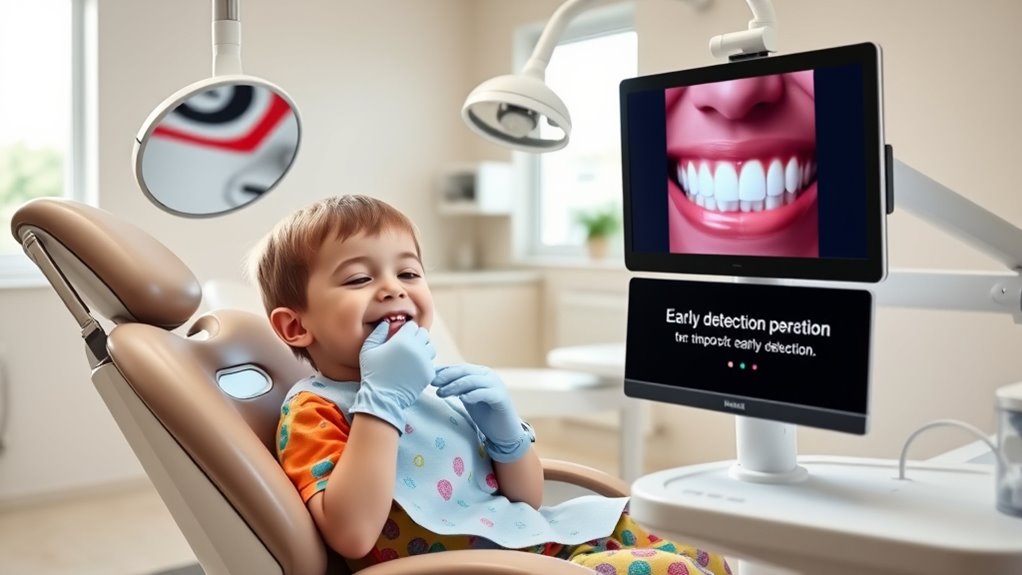
Early detection of dental issues is crucial because identifying problems early allows for simpler and less invasive treatments. Regular check-ups help you spot dental issues like cavities, gum disease, or other concerns before symptoms appear. Preventive care during these visits can significantly reduce the need for extensive dental procedures later on. During these visits, your dentist performs visual examinations and uses X-rays to uncover hidden problems that aren’t visible to the naked eye. Catching dental problems early supports your child’s oral health and ensures proper dental development. Routine dental visits also help prevent the progression of oral health issues and promote better long-term outcomes. Additionally, understanding the importance of dental technology can improve early diagnosis and treatment planning. Advances in dental imaging have made it easier to detect issues at an earlier stage, increasing the chances of effective treatment. Incorporating early intervention strategies can further improve the prognosis and minimize discomfort. Addressing issues promptly can prevent minor concerns from becoming serious and costly. Routine visits also help reduce dental emergencies by addressing potential problems proactively.
Monitoring Growth and Development
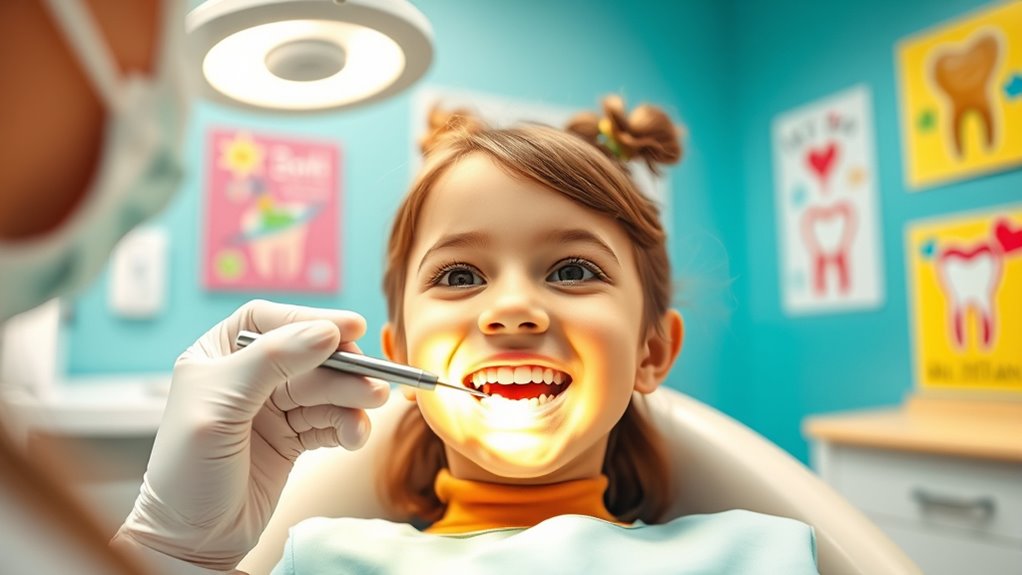
Regular dental visits let you track how your child’s teeth are erupting and growing. They also help spot any developmental concerns early, so issues like misalignment or jaw problems can be addressed promptly.
Tracking Tooth Eruption Patterns
Tracking tooth eruption patterns is essential for ensuring your child’s teeth develop normally. Regular check-ups allow you to monitor growth and observe the sequence and timing of primary and permanent teeth. Electric power generated during dental procedures or from bike generators can sometimes be used to power small dental devices, highlighting the versatility of renewable energy sources. This innovative approach demonstrates the potential for sustainable solutions within healthcare settings, aligning with the News focus on advancements and innovations. This helps detect any delays or abnormalities early, enabling prompt intervention to support healthy dental development. By reviewing eruption patterns, your dentist can predict future dental stages and plan orthodontic treatments if needed. Additionally, understanding the significance of spiritual principles such as patience and vigilance can encourage parents to stay consistent with dental visits. Monitoring these patterns also aids in identifying impacted or missing teeth, preventing long-term issues. Regular dental visits provide a clear picture of your child’s oral health, ensuring proper alignment and spacing of teeth as they emerge. Staying vigilant with regular check-ups supports healthy growth, giving your child a strong foundation for a lifetime of good oral health. Moreover, advancements in dental technology continue to improve early detection and treatment options, further emphasizing the importance of routine dental assessments. Recognizing the importance of early intervention can help address potential issues before they become more complex and costly to treat.
Identifying Developmental Concerns
Monitoring your child’s growth and development during dental check-ups plays a crucial role in spotting potential concerns early on. By monitoring growth, your dentist can identify developmental issues such as malocclusions, missing teeth, or abnormal jaw growth before they worsen. Additionally, understanding cultural beliefs surrounding astrology and beauty can sometimes influence perceptions of dental aesthetics and timing. Early detection of abnormalities like delayed tooth eruption, extra teeth, or jaw asymmetries helps prevent more complex problems later. Regular exams also allow for timely orthodontic planning, ensuring your child’s teeth and jaw develop properly. Recognizing developmental concerns early enables proactive management, reducing the risk of future dental complications. Staying consistent with check-ups gives your child’s dentist the opportunity to observe growth patterns and intervene if needed, supporting healthier, properly aligned teeth and a functional bite as they grow. Paying attention to early developmental milestones during these visits further enhances the ability to address concerns promptly and effectively. Moreover, understanding growth and development patterns can assist in planning appropriate interventions for optimal dental health outcomes and preventive care strategies.
Planning Orthodontic Interventions
How can you guarantee your child’s orthodontic needs are addressed early? Regular dental check-ups are essential for monitoring growth and development, helping identify orthodontic issues like malocclusion or developmental concerns before they worsen. These visits also allow your dentist to evaluate early detection of potential problems, which is vital for effective intervention. Additionally, routine exams can help identify signs of digital literacy issues that might affect your child’s ability to communicate about their oral health needs. Regular assessments can also help ensure that inspection skills are developing properly, supporting accurate diagnosis and treatment planning. Early detection of potential problems allows for timely orthodontic treatment, which can minimize the need for extensive braces or corrective procedures later. Preventive care through routine exams helps you stay ahead of issues, supporting ideal oral health outcomes.
Preventive Care and Oral Hygiene Education
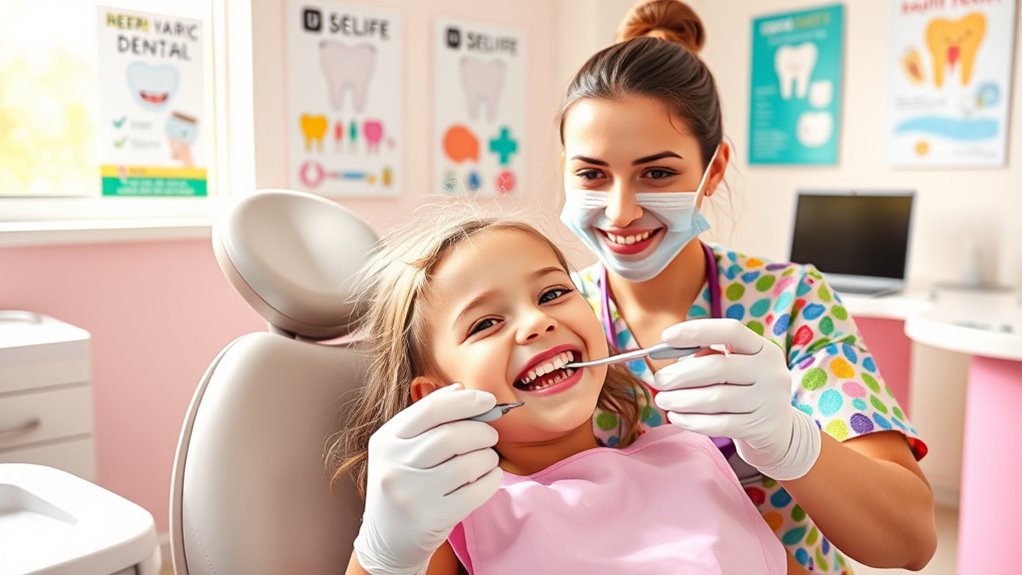
Have you ever wondered why regular dental check-ups are so important for kids? These visits focus on preventive care and oral hygiene education, which are key to maintaining children’s dental health.
During a dental check-up, your child benefits from professional cleaning that removes plaque and tartar that brushing alone can’t eliminate. Dentists also provide personalized advice on good oral hygiene practices, including proper brushing and flossing techniques. This proactive approach can help prevent more serious dental issues later on, especially in environments with varying climate control conditions that affect oral health.
Additionally, treatments like fluoride applications and sealants strengthen enamel and help prevent cavities. Regular visits enable early detection of issues like cavities or gum problems, allowing for prompt treatment before they worsen. Knowing the importance of dental records management can also improve ongoing care and treatment planning.
Furthermore, consistent dental check-ups reinforce healthy habits and can include cake pop education, which helps children understand the importance of maintaining good oral hygiene in a fun and engaging way, setting your child up for a lifetime of good oral hygiene and a confident smile.
Research shows that regular dental visits can also help monitor payment security and prevent potential fraud or security issues related to dental billing and records management. Staying informed about quality assurance practices in dental care can further ensure your child’s health is protected during each visit.
Building Positive Dental Experiences

Creating positive dental experiences from an early age sets the foundation for a lifetime of healthy habits. A child-friendly dental environment, with colorful decor and engaging tools, helps make visits enjoyable and less intimidating. Incorporating positive reinforcement techniques can significantly improve a child’s cooperation and attitude toward dental care. When you prioritize building trust through gentle, compassionate techniques and positive reinforcement, your child feels more comfortable and willing to cooperate during check-ups. Early dental visits that focus on educating children in an age-appropriate way can reduce dental anxiety and foster positive associations with dental care. Involving children in their oral hygiene routines using fun, age-appropriate tools can further promote good habits. Incorporating vetted dental products for kids can also contribute to establishing good oral hygiene routines from the start. This approach encourages children to view dental visits as a normal, caring part of health maintenance. Ultimately, creating positive dental experiences helps establish a sense of comfort and confidence, making future visits smoother and supporting lifelong oral health habits.
Establishing a Routine for Lifelong Oral Health
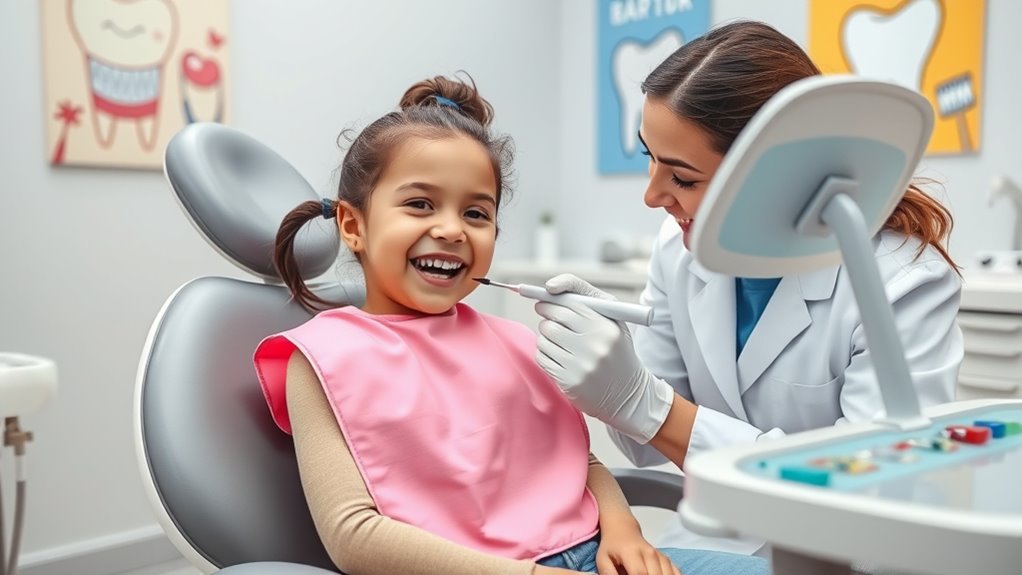
Scheduling dental check-ups every six months helps create a routine that encourages lifelong oral health habits. Regular visits from an early age teach your child the importance of consistent dental care and healthy habits. Over time, this routine reduces dental problems and builds confidence in maintaining good oral hygiene. Incorporating fun and engaging activities like dessert-themed treats can also motivate kids to take an active interest in their dental health, making routine visits something they look forward to. Establishing a dental routine early on can foster a positive attitude toward oral care that lasts a lifetime. Additionally, understanding the significance of toothbrush effectiveness can help ensure children are cleaning properly between visits.
Consistent Dentist Visits
Establishing a routine of regular dentist visits every six months plays an essential role in promoting lifelong oral health. Consistent dental check-ups help with early detection of problems, making preventive care more effective. Regular visits also allow pediatric dental professionals to monitor oral development, reducing the risk of long-term issues. Additionally, a predictable routine can lessen dental anxiety by familiarizing your child with the process. These routine appointments reinforce good oral hygiene habits and highlight the importance of ongoing oral health monitoring. Establishing these visits as a habit can also help children associate dental care with positive experiences, encouraging lifelong habits. Furthermore, preventive care through routine check-ups can significantly decrease the need for extensive dental treatments later in life. Maintaining dental health awareness is crucial for fostering healthy habits from an early age. Over time, this consistent approach creates a strong foundation for healthy teeth and gums for life, especially when combined with proper oral hygiene practices.
Healthy Habits Development
Building a consistent daily oral hygiene routine from a young age helps your child develop habits that last a lifetime. When children learn proper oral hygiene early on, they build a foundation for good dental care and healthy habits.
Regular check-ups reinforce the importance of preventive care, allowing dentists to teach effective brushing and flossing techniques. These routine dental visits promote early detection of potential issues and foster a positive attitude toward dental care, reducing fear.
Developing a habit of biannual dental visits ensures ongoing maintenance and minimizes risks of cavities, gum disease, and other dental problems. By establishing these routines early, you set your child on a path toward lifelong oral health and confidence in their dental care practices.
Addressing Dental Anxiety and Fears

Addressing dental anxiety and fears is essential for helping children feel comfortable during visits. When you focus on fear reduction, you create calm dental visits that promote trust-building. Pediatric dentists use child-friendly techniques to ease dental anxiety and foster positive experiences.
Early exposure to dental care routines helps children develop coping skills and reduces the risk of dental phobias later on. Positive reinforcement during appointments encourages cooperation and reassures your child.
Clear communication about procedures also alleviates fears and makes visits less intimidating. By prioritizing these approaches, you make dental visits a positive part of your child’s health journey, setting the stage for lifelong good habits and a healthy smile.
- Use positive reinforcement to boost confidence
- Incorporate gentle, child-friendly techniques
- Promote early exposure for better comfort
- Focus on trust-building and open communication
Supporting Overall Well-Being and Confidence
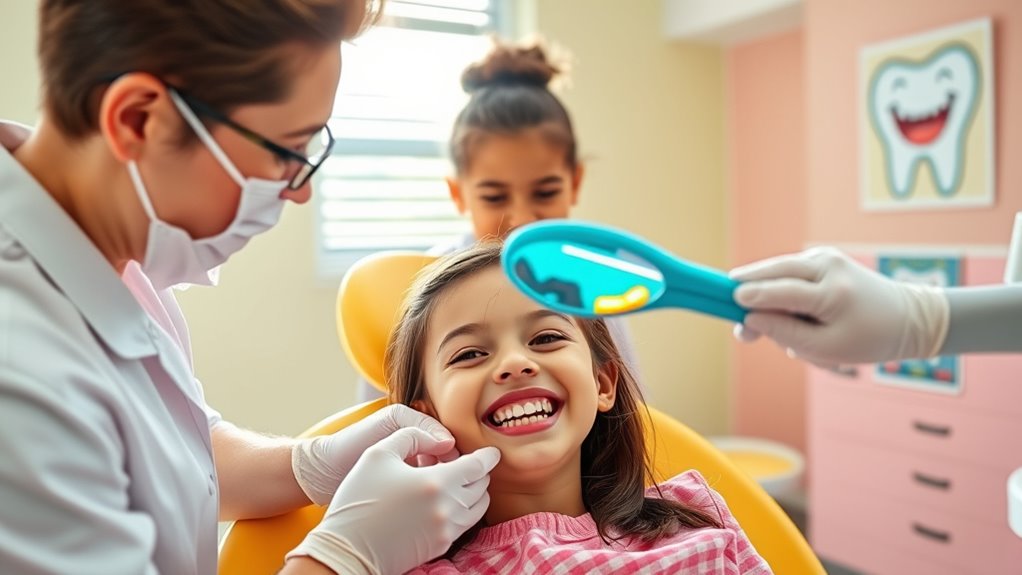
Supporting your child’s overall well-being and confidence starts with maintaining good oral health through regular dental check-ups. A healthy smile can substantially boost your child’s self-esteem and ease social interactions.
When you prioritize routine visits, you help identify and treat oral health issues early, preventing pain and discomfort that could affect confidence. Good oral health also supports speech development and communication skills, which are crucial for self-assurance.
Regular check-ups foster positive experiences that encourage your child to care for their teeth, building lifelong confidence in personal care routines. Preventive care reduces the risk of dental problems that might cause embarrassment or self-consciousness.
Ultimately, these visits contribute to your child’s overall well-being, helping them feel confident and comfortable in their smile.
Preventing Future Dental Emergencies

Regular dental check-ups play an essential role in preventing future emergencies by catching problems early. When you keep up with routine visits, you help prevent cavities and monitor dental development, reducing the risk of dental trauma and urgent issues.
Dentists can spot early signs of gum disease or misaligned teeth, preventing painful emergencies later. Regular check-ups also support oral health maintenance, making it less likely you’ll face unexpected dental emergencies.
Through professional dental care, you can address potential problems before they worsen, saving you discomfort and costly treatments. By establishing a routine, you’re actively working to prevent dental emergencies and protect your child’s dental health.
- Detect cavities and gum issues early
- Monitor dental development and jaw health
- Prevent dental trauma through professional advice
- Promote good oral hygiene habits
Enhancing Academic Success and School Performance

Keeping up with routine dental check-ups not only prevents painful dental issues but also helps children perform better in school. Good oral health from regular dental visits reduces the risk of cavities and gum disease, which can cause discomfort and distract kids during lessons.
When your child maintains good oral hygiene through these visits, it supports proper speech development, enabling better communication and classroom participation. Dental problems like toothaches can impair concentration and memory, negatively impacting kids’ academic performance.
Early detection during check-ups guarantees timely treatment, minimizing school absences and promoting school success. Visiting a pediatric dentist regularly makes sure dental issues are caught early, allowing your child to stay focused and engaged, ultimately supporting their overall school performance.
Frequently Asked Questions
Why Is It Important to Have Regular Dental Check-Ups?
You should understand that regular dental check-ups are essential because they catch problems early, like cavities or gum disease, before they get worse. These visits help monitor how your child’s teeth and jaw are developing, ensuring proper growth and alignment.
They also let the dentist clean away plaque and tartar, reducing future decay. By going twice a year, you promote healthy habits that can save money and discomfort later.
How Often Do Children Need Dental Check Ups?
Think of your child’s teeth like a garden; regular check-ups are like watering and tending to prevent weeds. Children should visit the dentist every six months, according to the American Academy of Pediatric Dentistry. These visits catch problems early, like spotting weeds before they spread.
Some kids with specific needs may need more frequent visits. Consistent check-ups help guarantee a healthy, bright smile that lasts a lifetime.
What Happens if You Never Take Your Kid to the Dentist?
If you never take your kid to the dentist, oral health problems can go unnoticed and worsen over time. Cavities, gum disease, and infections might develop without warning, causing pain and possibly affecting their overall health.
Without professional cleanings, plaque builds up, leading to tooth decay and loss. Missing regular check-ups can also impact their confidence, speech, and school performance, making early dental visits essential for their well-being.
What Is the Reason for Your Child’s Dental Visit?
You take your child to the dentist to catch problems early, like cavities or gum issues, before they get worse. Regular visits help monitor how their teeth and jaw are growing, so you can address any concerns promptly.
Plus, professional cleanings and fluoride treatments keep their teeth healthy. These visits also give you a chance to ask questions and establish good habits, setting the foundation for lifelong oral health.
Conclusion
Regular dental check-ups are essential for your child’s health and confidence. They catch problems early, teach good habits, and make visits less stressful. Building this routine now sets the foundation for a lifetime of healthy smiles and overall well-being. Remember, “A stitch in time saves nine”—addressing dental issues early saves your child from bigger problems later. Keep up with regular visits, and you’ll help your child enjoy a brighter, healthier future.









